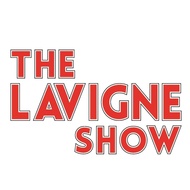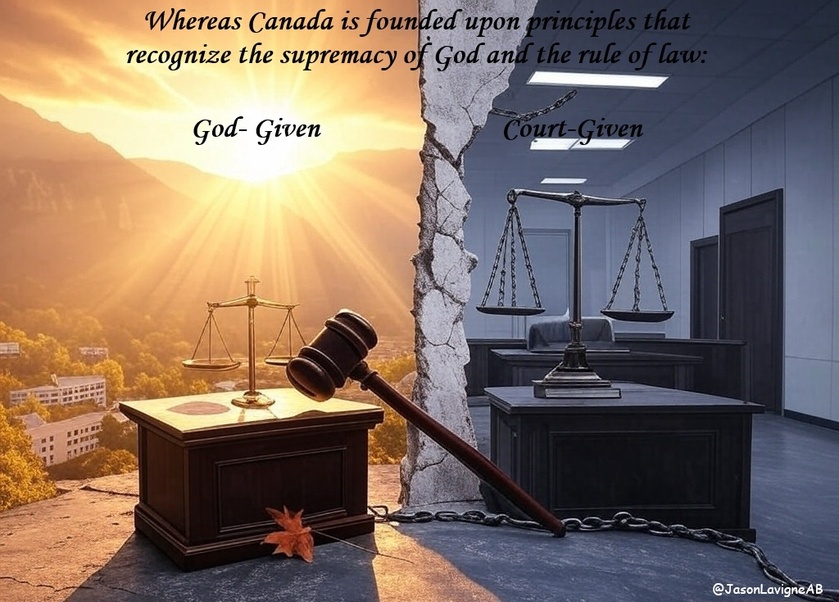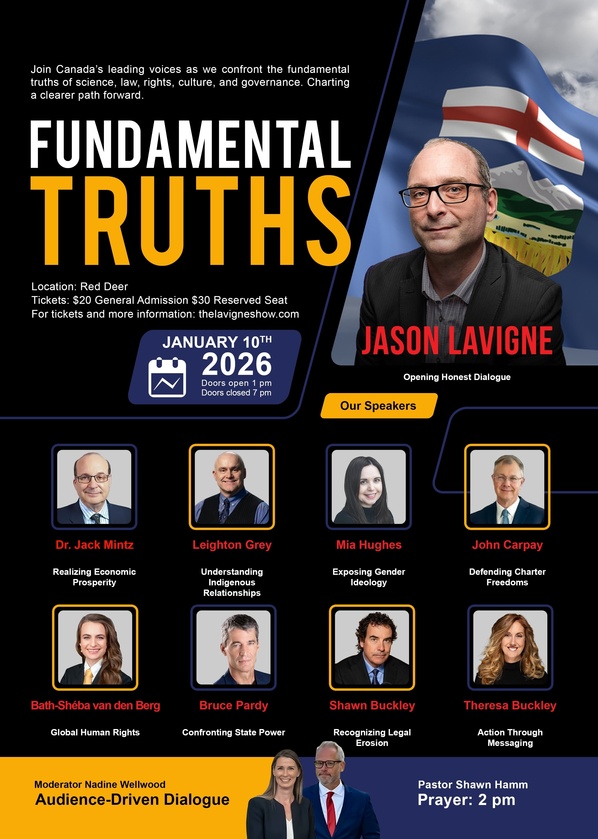
Throughout Canada’s modern era, one guiding truth has held constant for many citizens of faith: that our fundamental rights and freedoms originate from a higher authority—God—rather than mere privileges granted by government or courts. When the Canadian Charter of Rights and Freedoms was introduced in 1982, the drafters inserted a crucial statement at the very outset:
“Whereas Canada is founded upon principles that recognize the supremacy of God and the rule of law: …”
According to former Newfoundland Premier Brian Peckford, the last living signatory to the Charter, this statement, followed by a colon, was deliberately designed to be read before each section of the Charter. It was not a ceremonial “preamble” but a constant framing principle, meant to remind legislators, judges, and citizens alike that the Charter’s rights have a transcendent source. The supremacy of God was intended to inform and contextualize all subsequent articles, rather than be relegated to symbolic status or ignored altogether.
Over time, however, Canadian courts have increasingly treated the acknowledgment of God’s supremacy as a mere flourish, stripping it of legal force. This shift has had profound consequences: it effectively transfers the moral grounding of our rights from a divine foundation to one determined by judicial rulings. As courts frame these freedoms less as “God-given” and more as “court-given,” Canadians have gradually seen the original moral framework replaced by a purely secular, malleable standard of what is “reasonable.”
How Canada’s Courts Marginalized the Charter’s Opening Statement
The initial vision of inserting the recognition of God’s supremacy was a response to widespread concern that the new Charter might abandon Canada’s moral and spiritual underpinnings. Thousands of Canadians wrote letters and petitions urging legislators to include it. Legislators, including then-Premier Peckford, insisted on a statement affirming God’s pre-eminence, thus acknowledging that government is beneath a higher moral authority.
This was treated as a symbolic use over time; despite the explicit “Whereas …:” format, courts have largely dismissed or minimized this statement. Many judges and constitutional scholars call it a “preamble,” implying it carries no substantial legal weight. Consequently, judicial decisions seldom invoke the supremacy of God to guide interpretation of individual rights or government powers. As a result, the statement has lost most of its intended effect.
The rise of the Oakes Test is one of the most apparent markers of this secular pivot, as the Supreme Court’s adoption. Created in the landmark case R. v. Oakes (1986), it provides a multi-step process for determining whether the government can justify limiting a Charter right under Section 1. Key prongs of this test include proving a “pressing and substantial objective” and ensuring the measure is “proportional” and minimally impairs the right. Noticeably absent is any explicit reference to a higher moral code, divine principle, or the supremacy of God. Instead, the test relies primarily on secular reasoning and judicial balancing of interests.
In short, Canada’s courts no longer treat our rights as morally anchored in God’s supremacy. Instead, they are weighed and shaped by legal frameworks that reflect evolving social values and subjective interpretations of “reasonable limits.” When the supreme authority is merely the courts, fundamental freedoms can become malleable, especially during political pressure or shifting cultural tides.
The Erosion of God-Given Rights
Many Canadians who value Canada’s Christian heritage see direct correlations between diminishing recognition of God and the erosion of rights once considered inviolable.
With the opening statement set aside, questions of conscience and religious exercise often undergo purely legalistic balancing. By ignoring the transcendent source of conscience rights, courts have been more readily subjecting them to limitations for “public policy” reasons.
Paramount are the Freedoms of Expression and Association. These freedoms, once grounded in a belief that every human is imbued with inherent dignity by God, are increasingly argued in purely pragmatic terms, such as what is beneficial for society or permissible by law, as determined by shifting majority views. Without higher moral grounding, unpopular speech or minority associations might be curtailed more easily.
Moral underpinnings in legislation, including abortion laws, marriage definitions, euthanasia policies, and more, have been shaped by courts applying secular “reasonableness” tests, rather than seeking moral resonance with any notion of divine law. Many, including myself, argue that a society that divorces these life-and-death questions from the supremacy of God risks losing its moral compass.
Why a Return to the Supremacy of God Matters
A society that recognizes rights as “God-given” views individual freedoms as intrinsic and non-negotiable, and the government is simply a steward of those rights, not their origin. In contrast, when courts assume the role of final moral arbiter, rights are restricted, redefined, or dismissed in the name of competing state interests. Appeals to tradition, conscience, or religious convictions become secondary to judicially fashioned norms.
To provide a moral compass by recognizing God’s supremacy doesn’t mean imposing a single religion. Instead, it reaffirms that there is a moral order above human institutions and that laws and court decisions must be grounded in more than transient cultural trends or political expediency.
We must acknowledge that rights truly flow from a divine source to protect individual dignity. Then, neither Parliament nor the judiciary can legitimately infringe upon them except under the most exceptional circumstances. This principle fortifies every individual’s worth, reducing the risk of state overreach.
We must ensure consistency by acknowledging God’s supremacy. This offers a moral framework that can guide legislators and courts, guarding against ever-shifting conceptions of “reasonable” or “proportionate” infringements on rights. It maintains continuity with Canada’s founding principles as expressed by its earliest leaders, who named it the “Dominion” in direct reference to a biblical imperative.
Practical Steps to Restore the Founding Vision
Supporting elected officials who recognize God’s supremacy is the most straightforward and most direct method of democratic action. By electing Members of Parliament who respect the moral foundation set out in the Charter’s opening lines and actively affirm that Canada’s rights come from God, citizens can begin to shift political discourse back to first principles.
Revisit the Charter’s founding statement in the House of Commons by hearing parliamentarians and their constituents call for a renewed emphasis on reading the Charter’s opening reference to “the supremacy of God and the rule of law” when drafting new legislation or debating bills that limit fundamental rights. This would reflect Brian Peckford’s original expectation that these words are not a “preamble,” instead, they inform every clause of the Charter.
Educating and advocating via faith communities, think tanks, and educational institutions can organize to highlight the intended meaning of “Whereas Canada is founded upon principles that recognize the supremacy of God and the rule of law” via public awareness campaigns, seminars, and educational materials that can illuminate how courts have diverged from this guiding principle and why it matters.
Challenge the courts to revisit or replace the Oakes test. While the Oakes test is a fixture of Canadian constitutional law, litigants and legal scholars can push for a renewed interpretation that does not ignore the moral grounding declared at the outset of the Charter. Even small shifts, such as acknowledging that certain rights rest on transcendent principles, could significantly impact future case law.
Our Future
When Canada’s founders and the architects of the Charter insisted on recognizing “the supremacy of God,” they affirmed that human rights originate outside the realm of government. They sought to protect individuals from shifting cultural tides and majoritarian rule by placing ultimate authority above political and judicial power. Over time, however, courts have largely sidelined this grounding principle, effectively replacing God-given rights with court-given ones.
Reasserting the supremacy of God is not about imposing a single doctrinal view. Instead, it is about renewing Canada’s moral and spiritual inheritance, ensuring that our fundamental freedoms are firmly anchored in an authority higher than the state. If the courts do not acknowledge it, a grassroots movement of electing MPs who openly champion this founding principle could rekindle the intended moral compass. Canadians can restore the balance by pressing their representatives to once again respect that the rights enshrined in the Charter come not from Parliament, nor the courts, but from our Creator. And with that renewed perspective, Canada can safeguard the dignity and freedom of all, guided by enduring moral truth rather than transient judicial decree.
God bless Canada, and God bless you.

Join Paula & Jay over Tea & Coffee as they talk about the news of the day, life, and whatever comes up. Special Guest: Bruce Pardy
On January 10th, Canada’s leading voices in law, science, economics, Indigenous relations, youth protection, and government authority come together to reveal the Fundamental Truths shaping our country’s future.
Featuring
Jason Lavigne
Accredited Independent Journalist & Host of The Lavigne Show
Dr. Jack Mintz
Economist & Public Policy Scholar
Leighton Grey, K.C.
Constitutional Lawyer & Indigenous Rights Advocate
Mia Hughes
Director, Genspect Canada & Senior Fellow, MacDonald-Laurier Institute
John Carpay
President, Justice Centre for Constitutional Freedoms
Bath-Shéba van den Berg
Human Rights Lawyer & Specialist in International Law
Bruce Pardy
Professor of Law, Queen’s University & Executive Director, Rights Probe
Shawn Buckley
Constitutional Lawyer, Founder and Former Lead Counsel of the NCI, Founder & President of the NHPPA
Teresa Buckley
NHPPA & Former NCI Communications and Executive Director
Moderator: Nadine Wellwood
Political Commentator & Public Policy Advocate
...

Due to the need to vote on several bills in the Legislature today, this interview with Hon. Mickey Amery will need to be rescheduled.
I'll post a new date and time as soon as I receive one.
Thanks!
Hi supporters,
It has been a long campaign and evening. Sadly, it appears that Team Lavigne won't be elected this time around.
We thank everyone who took the time to support us and got out to vote.
For the rest of the week, we are going to recharge, regroup, and get back to several projects that took a backseat to the campaign.
We'll be back next week ready to bring you even more shows, interviews, and truth.
Much love, God bless.












